#from the story by daphne du maurier
Text

me & the mutuals
#this is from a border-line case by#daphne du maurier#truly some insane psychosexual relationship drama even for her#quotable#id in alt text#read this last night before the melatonin kicked in and IMMEDIATELY knew this one needed to be a post#i have two short stories left in the collection and this is my favourite so far
11 notes
·
View notes
Text
finished hill house
#now im gonna try to find the movie from the 60s#or watch other older movies im on my old movie bs too#i think i liked we have always lived in the castle better but stilll good#i have this book of more of her short stories might read that next#that or a nonfiction or another daphne du maurier decisions decisions
5 notes
·
View notes
Photo

Daphne du Maurier, from "The Apple Tree", The Birds and Other Stories (1952)
#daphne du maurier#the birds and other stories#short stories#typo#typography#quote#quotes#fragments#ghosts#*
9K notes
·
View notes
Text
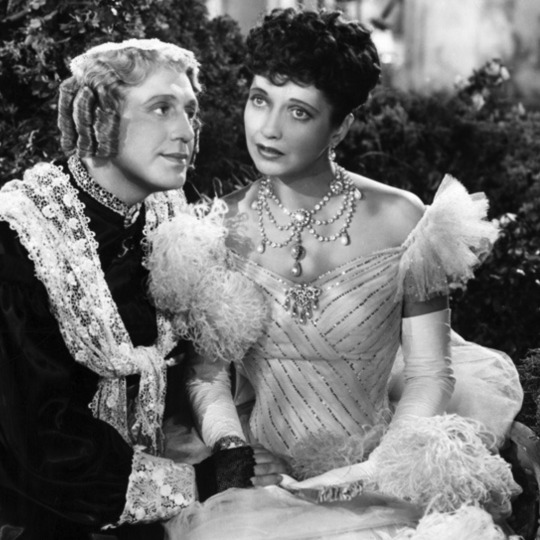
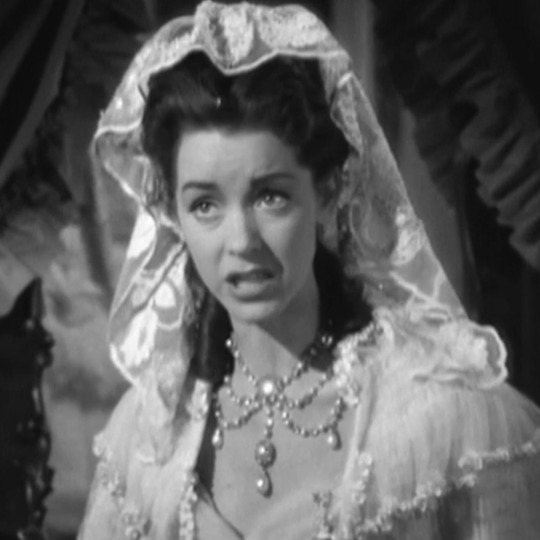
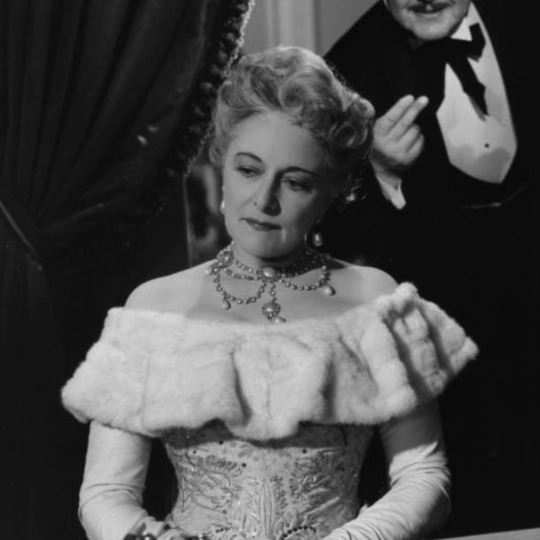
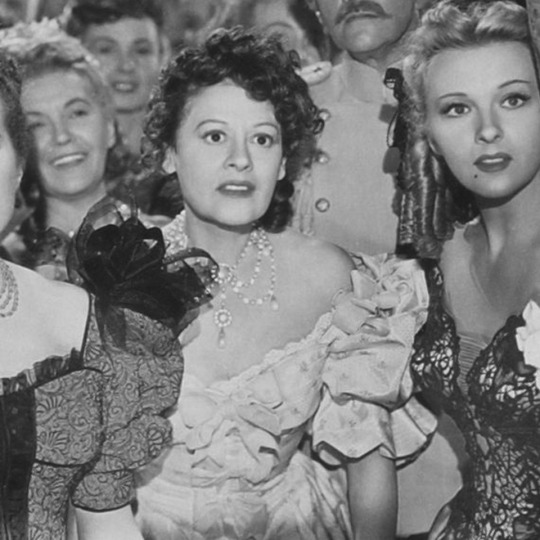
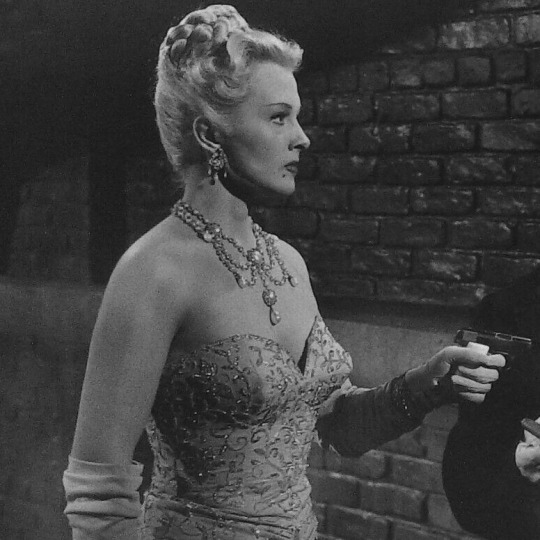
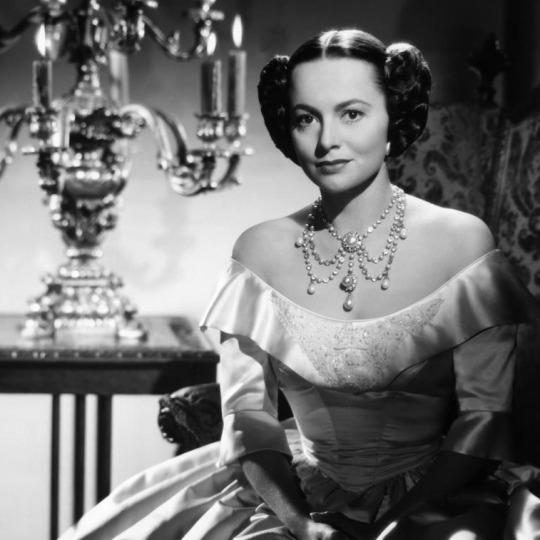
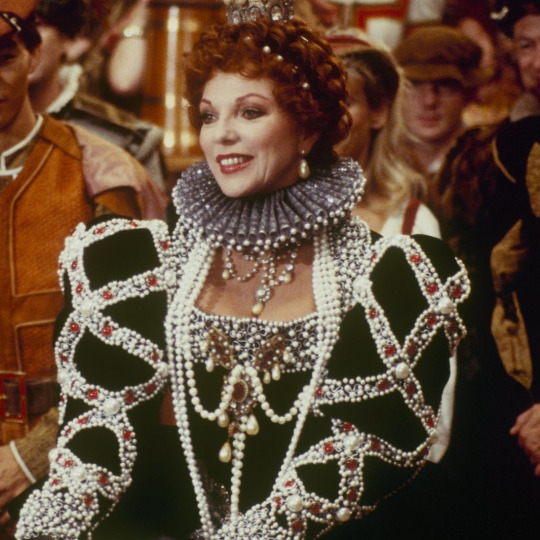
This distinctive pearl necklace was designed by Joseff of Hollywood, who created jewelry for many films during Hollywood’s Golden Age. Because Joseff was not contracted to a particular studio, he was able to rent out his pieces to all of the film studios.
The above necklace first appeared on Kay Francis as Donna Lucia d’Alvadorez in the 1941 adaptation of Charley’s Aunt. In 1945 it appeared on Marsha Hunt as Constance Scott in The Valley of Decision. The following year saw it worn on the neck of Nella Walker as Mrs. Lawrence Tyburt Patterson Sr. in Two Sisters from Boston. 1947’s Northwest Outpost used it on Lenore Ulric as Baroness Kruposny. Ilona Massey was next to wear the piece as Madame Egelichi in the 1949 Love Happy.
In the 1952 adaptation of Daphne Du Maurier’s novel My Cousin Rachel, Olivia de Havilland wore the necklace as Countess Rachel Sangalletti Ashley, and it features somewhat in the plot of the production. Richard Burton’s character gives the necklace to Rachel as a symbolic gesture that he wishes to marry her, which sets the remainder of the story into motion. The passage in the novel describing the necklace says:
There were four strands. They fastened around the neck like a band, with a single diamond clasp.
The description in the novel obviously does not match its representation on screen, but it is a beautiful necklace nonetheless.
Finally, in 1987, the necklace was seen on Joan Collins’ character Alexis Carrington Colby in the episode of Dynasty entitled The Fair.
The necklace eventually went up for auction at Julien’s Auctions in the 2017 Joseff of Hollywood: Treasures from the Vault. The action describes the piece as:
A triple-strand, tiered necklace of alternating simulated diamonds and pearls with pearl drops. The necklace has four simulated mabe pearl medallions and is stamped on the back “Joseff Hollywood.”
To learn more about Joseff of Hollywood jewelry, you can visit their official website, or read Jewelry of the Stars: Creations from Joseff of Hollywood by Joanne Dubbs Ball.
Costume Credit: Dean, Eugene Joseff (Joseff of Hollywood), Veryfancydoilies, Katie S., Solidmoonlight
Follow: Website | Twitter | Facebook | Pinterest | Instagram
253 notes
·
View notes
Text
"She belonged to the spirit world,
a world of fantasy and ghosts."
- Daphne du Maurier, from “The Apple Tree”, The Birds and Other Stories (1952)
132 notes
·
View notes
Text
daphne du maurier books come in three flavors:
1. let me tell you about the time 30 years ago when I lost my heart to a tender adventuring scoundrel before I realized that life is pain and the only constant is the blue Cornish sea
2. This Family is Insane and I’m going to tell you their story for anywhere from 5 to 200 years but at least they have the blue Cornish sea
3. the past is real and it will kill you but the blue Cornish sea never changes
#daphne du maurier#frenchman’s creek#rebecca#my cousin rachel#jamaica inn#hungry hill#the loving spirit#the king’s general#the house on the strand#cornwall
549 notes
·
View notes
Text
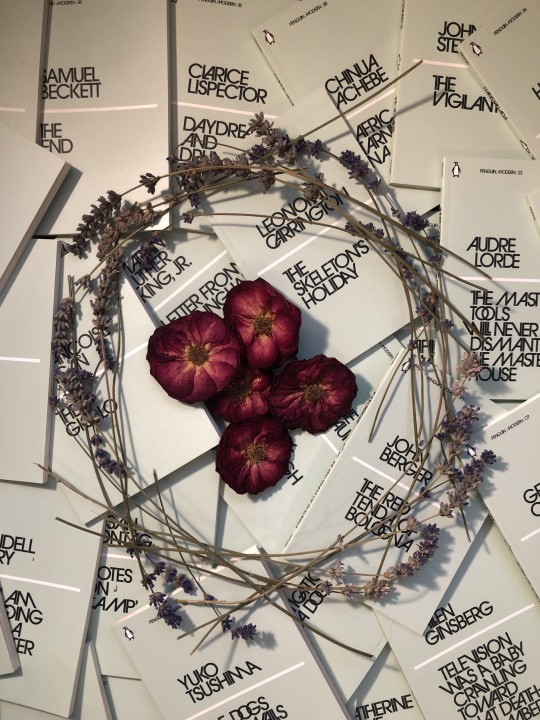

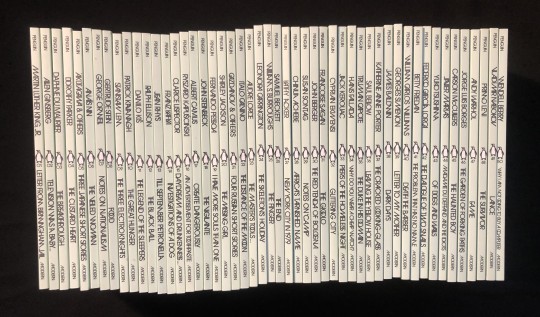
Part 1: This is a collection of short stories, 50 penguin's modern classics.
LETTER FROM BIRMINGHAM JAIL by MARTIN LUTHER KING, JR. This landmark missive from one of the greatest activists in history calls for direct, non-violent resistance in the fight against racism, and reflects on the healing power of love.
TELEVISION WAS A BABY CRAWLING TOWARD THAT DEATHCHAMBER by ALLEN GINSBERG. Profane and prophetic verses about sex, death, revolution and America by the great icon of Beat poetry.
THE BREAKTHROUGH by DAPHNE DU MAURIER. A scientist's attempt to solve the mystery of life after death has chilling consequences, in this eerie tale from a virtuoso writer of suspense.
THE CUSTARD HEART by DOROTHY PARKER. Wise-cracking and heartbreaking, these tales of women on the edge by the legendary wit Dorothy Parker show the darkness beneath the surface of the Jazz Age.
THREE JAPANESE SHORT STORIES by AKUTAGAWA & OTHERS. Three beguiling, strange, funny and hair-raising tales of imprisonment, memory and atrocity from early twentieth-century Japan.
THE VEILED WOMAN by ANAÏS NIN. Transgressive desires and sexual encounters are recounted in these four pieces from one of the greatest writers of erotic fiction.
NOTES ON NATIONALISM by GEORGE ORWELL. Biting and timeless reflections on patriotism, prejudice and power, from the man who wrote about his nation better than anyone.
FOOD by GERTRUDE STEIN. From apples to artichokes, these glittering, fragmented, painterly portraits of food by the avant-garde pioneer Gertrude Stein are redolent of sex, laughter and the joy of everyday life.
THE THREE ELECTROKNIGHTS by STANISLAW LEM. From a giant of twentieth-century science fiction, these four miniature space epics feature crazy inventors, surreal worlds, robot kings and madcap machines.
THE GREAT HUNGER by PATRICK KAVANAGH. By turns tragic and comic, irascible and exalted, these are some of the most beloved poems by a writer who transformed Irish verse.
#nejj bookblr#classic books#light academia#dark academia#academia#reading#books#booklr#home library#literature#lit#book review#book recommendations#fiction#modern classics#english literature#book blog#bookblr#book haul#photography
24 notes
·
View notes
Text
Finished Rebecca by Daphne du Maurier last night and oh my god how do I even begin to describe this book... It is SO good.
The way our perception of Rebecca is completely changed by what Maxim says and what he says is basically the only insight we have on what actually happened, and the way he is really unreliable so we will never know who is actually the bad guy in this story.
How the main character has no name cause this story isn't really about her, it's about Manderley, it's about Rebecca.
I love that Manderley itself feels like a character and how it seems to have control over everybody... When Manderley ends, the story ends.
And the fire is a curse as much as a liberation, Rebecca's last victory, her last curse, liberation from all of her schemes, liberation from the pressures to maintain a historical family estate, freedom from memories, from the past and from the ghost of Rebecca.
I must confess that at first I, like many, thought this was a romance book, our main couple being haunted by the memories of Maxim's ex wife and her beauty, but upon thinking further, this book takes a situation so bizarre, our main character stuck in this really weird marriage, Maxim acting cold and distant and never telling the narrator what she did wrong, while also not giving her insight into his past for her to understand why what she did was wrong, treating the narrator like a child, which she basically is, the insane 20 year age gap, and I absolutely love that at first glance and not thinking much about it, the author makes us think this is normal, even after the revelation towards the end of the book, Maxim is the good guy, and Daphne du Maurier makes such a great job of making the reader irrationally root for him, cause after all we want what the narrator wants. But then you think about it and, is Rebecca really the bad guy? Is Maxim really the good guy? Did Rebecca really deserve what she got for what she did? At what point does Maxim turn from a tired man who just wants real love and someone faithful, into a murderous manipulator who just hated the way Rebecca stood up to his lack of emotion by doing what she wanted, so he made up all this story about how she was a sociopath to justify what he did to her??
Also Mrs. Danvers.... Oh my god Mrs. Danvers who was insanely loyal to Rebecca, who knew of Rebecca's insanity and disgust towards men and embraced it and loved it, who had a sort of weird one sided psychosexual relationship with Rebecca and who makes the narrator's life a living hell because of her loyalty to Rebecca, the chokehold Rebeca has on the world even after she is dead, and the fact that her whole life was devotion to Rebecca, and it shows by that ending, if her Rebecca can't own Manderley, no one can. All the scene's with the narrator and Mrs. Danvers in Rebecca's room, especially the window one, that were just perfectly written, perfectly suspenseful, show us just how Rebecca was the mastermind, she was pulling the strings even after her death, she bended everything to her will, even the weather, how can someone else ever possibly be the Mrs. de Winter of Manderley?
Just as a final thought, I love the gender fuckery of it all, the main character is a sort of Haruhi from OHSHC, she couldn't care less if she looks like a boy or a girl, cause frankly it isn't even important for the story, she asks Maxim not to love her, but to treat her like a companion, a friend, "a sort of boy". And I think that's really cool, after all, gender doesn't matter in this story, only Rebecca, and we also know Rebecca wasn't big on gender roles either haha ("should've been a boy" as said by Mrs. Danvers)
I cannot squeeze anymore thoughts out because I also haven't had breakfast yet BUT I absolutely loved this book and I will so absolutely read it again, I'll shut up now, I've rambled enough :)
#rebecca#daphne du maurier#I don't even know if half of this makes sense but yeah#my thoughts are so unorganized it's insane#this post is like a draft for my school essay and i'm just doing it to organize ideas while sharing my thoughts with the internet#look how fun#anyways i'll eat smth now bye bye
30 notes
·
View notes
Text
2023 bookpost 🥳🥳🥳
43 books read this year! about 2/3rds of last year's number, but i fell off pace in summer and for the last two months and never actually have a target or care about my pace anyways, so 43 is a good solid number imho. as last year, full list with light commentary below, recs are bolded:
JANUARY
Neuromancer by William Gibson
The Browns of California: The Family Dynasty that Transformed a State and Shaped a Nation by Miriam Pawel (i am punished for my desire to learn more about the two governors brown's effects on the state of california with: family hagiography. should have known tbh)
Between Two Fires by Christopher Buehlman (SOOOOOO GOOD. apocalyptic/religious horror in 1350's france during the black plauge. for fans of the terror, and fans of people who are in love but for whom the love won't alwayshelp!)
The Mirror and the Light by Hilary Mantel (hilary ilu u were one of the greatest novelists of the past hundred years it was an honor to be alive at the same time as you. this could have been 200 pages shorter. ilu tho)
Did Ye Hear Mammy Died? by Seamas O’Reilly (short, sweet childhood memoir of the irish writer/comedian who, famously, tweeted that story about meeting the president of ireland on ketamine.)
FEBRUARY
Either/Or by Elif Bautman (girls can i tell you. i didn't realize this was a sequel until like 100 pages into the book. that was on me.)
Two Doctors Gorski by Isaac Fellman (ah mr fellman. lol)
The Swimmers by Julie Otsuka (really cool piece of fiction, first half told from the collective viewpoint of a group of regulars at a public swimming pool, second half about the one specific swimmer who's losing her independence to dementia. short, packs a punch)
Rebecca by Daphne du Maurier (UNDEFEATED!)
One Man’s Terrorist: a Political History of the IRA by Peter Finn
Nightcrawlers by Leila Mottley (love to see local 22yos succeed wildly. does NOT mean this book was good god bless)
MARCH
The Memory Police by Yoko Ogawa
The Passenger by Cormac McCarthy
Stella Maris by Cormac McCarthy (to be clear, if you are not a cormac mccarthy fan, these books will not make you his fan. they are very much about this man's incredible hopelessness regarding a world that has invented and used the atomic bomb. what can be redeemed, etc etc. i loved them, despite a major part of the plot being consensual sibling incest, they were beautiful and phenomenal, they were not light reading)
APRIL
A Smile in his Lifetime by Joseph Hansen
Glory by NoViolet Bulawayo (cannot recommend the audiobook highly enough. emma read the paper copy to catch up to where i was in the audiobook so we could listen together on a car trip, and she agreesTM that the audiobook is the way to go)
MAY
Barbarian Days by William Finnegan
The Dark Lord of Derkholm by Dianna Wynne Jones
JUNE
We Don’t Know Ourselves by Fintan O’Toole (really really really cool nonfiction about ireland since the 1950s, part autobiography, more parts cultural history of a very quickly changing nation. fascinating to read this within 12 months of finn's one man's terrorist, which was a very leftist history of the IRA, and keefe's say nothing, which was an only very slightly leftist history of the IRA that was most interested in like, how compelling the history is (not a drag on it). o'toole not as big on the IRA as the other two! understandable!)
JULY
The Binding by Bridget Collins
The War That Killed Achilles by Caroline Alexander (for all fans of the history of the story of the illiad!!! short and passionate!)
Flux by Jinwoo Chong (solid new debut scifi - who thought it could still happen!)
I’m Glad My Mom Died by Jeanette McCurdy
The Witch King by Martha Wells (this book sucked ass!!! have mentioned this several times already this year!!!)
An Oral History of the New York Commune, 2052–2072 by Eman Abdelhadi and M. E. O'Brien (some things about this book were fun, many were infuriating, absolute worst had to be the insistence that in the future: therapy would solve even more problems that it does today :))
The Last Samurai by Helen DeWitt (see my beautiful wife's post on the subject)
Stay True by Hua Hsu (beautiful, deserves the pulitzer, not 100% my thing but still very good)
AUGUST
Demon Copperhead by Barbara Kingsolver (the voice was hard to get used to for the first 50 pages, but i ended up really liking this tbh. i've never read copperfield, so not sure if that improved the experience)
Crying in H Mart by Michelle Zauner
The Boys by Katie Hafner (a mistake to read this, but at least the twist was funny! there wasn't anything else in the book, but only a partial waste of time at the end)
Tomorrow and Tomorrow and Tomorrow by Gabrielle Zevin (finally read this, which has truly polarized my extended social circle, but i ended up liking it. i didn't always get what it was doing 100% of the time, and didn't so much feel compelled to find out, but i tore through it and will always be a sucker for a story about that doesn't fix you but does keep you alive. can see both sides of this debate)
American Overdose: The Opioid Tragedy in Three Acts by Chris McGreal (we have to kill every sackler. solid history of the epidemic. EVERY sackler.)
SEPTEMBER
The Season by Kristen Richardson (half-baked history of the debutante social ritual. but, not like there's many other histories of the subject!)
All the Horses of Iceland by Sarah Tolmie
Big Swiss by Jen Beagin (funny, contained extensive dirtbag lesbian behaviors, but lacked some heft at the end)
In Memoriam by Alice Winn (do you s2b2? do you want some solid, tome-like origfic? do you want all of those things and also siegfried sassoon rpf? well great news!)
Now We Shall Be Entirely Free by Andrew Miller (pleaseeeeeee tell me if you have read this or do read this it was SOOOOOO GOOD and i had NEVER heard of this guy before!!! fantastically written prose, everything builds with infinite dread to a single horrible punchline, i am still wowed thinking about it)
The Trees by Percival Everett (haha hey wanna get fucked up. dark dark dark comedy)
OCTOBER
Flowers from the Storm by Laura Kinsale (really enjoyable if slightly overlong romance novel that i got off a rec list for historical romances with disabled love interests. does a really good interesting job of giving the love interest full breadth and agency despite severe processing impairment following a stroke)
Mobility by Linda Kiesling
The Rachel Incident by Rachel O’Donahughe
NOVEMBER
NO BOOK NOVEMBER MFS
DECEMBER
Not Even the Dead by Juan Gómez Bárcena (would also like to know if anyone else has read this so we can try and figure out what the fuck was going on right at the end!! also the fact that this is primarily about mexican history, written by a spaniard, with the specter of the US very prominent in the book is like. hm i would love to be able to read some mexican press reviews of this lol)
When Crack Was King: A People's History of a Misunderstood Era by Donovan X. Ramsey (picked this up following the opioid book, which discussed but didn't go deep on how the country's reaction to the opioid epidemic was so vastly different from the crack epidemic. put a lot of stuff into context lmao.)
WAIT AT SOME POINT THIS YEAR I REREAD RUMO AND HIS MIRACULOUS ADVENTURES BY WALTER MOERS. I DON'T KNOW WHEN. DIDN'T WRITE IT DOWN. BUT I DID REREAD IT. 44 BOOKS. shout out to mr. moers for writing some extremely fucking creepy books for teenagers <3
okay i was gonna do more about like general trends and vibes of this year's books, also about the four books i am still reading rn lol, but i have been typing for soooooooooooo long so i'm just gonna reblog with more thots in the morning. stay prepared everyone
24 notes
·
View notes
Text
Horror is Queer
Horror has always had queer creators behind and infront of it.

F.W. Murnau directed Nosferatu (1922)
James Whale directed Frankenstein (1931), The Bride of Frankenstein (1935), The Invisible Man (1933), The Old Dark House (1932).
Clive Barker is a well known horror writer, I know Stephen King isn't the only one shocking. He's also directed some of his own work, notably, Hellraiser (1987), Nightbreed (1990), and Lord of Illusions (1995).
Kevin Williamson is the creator of Dawson's Creek, as well as, the screenwriter of Scream (1996), I Know What You Did Last Summer (1997), The Faculty (1998), and Sick (2022). He also did a treatment for and produced Halloween: H20 (1998).
Don Mancini is responsible for the Child's Play/Chucky franchise. He also wrote the screenplay for Dweller Celler (1998).
Eliva is a goth, camp, queen, ICON! She's a horror host, and lifestyle.
Christopher Landon wrote the screenplays for Disturbia (2007), Paranormal Activity 2, 3, 4, Next of Kin, and the Marked Ones which he also directed. He wrote and directed Scouts Guide to Zombie Apocalypse (2015), Happy Death Day (2017) and it's sequel (2019), Freaky (2020), oh and he's slated to direct Scream 7!
Bryan Fuller was the showrunner of NBC's Hannibal and is now working on the Friday the 13th prequel series, Crystal Lake.
Mary Shelley wrote Frankenstien.
Daphne Du Maurier wrote Rebecca and a short story that would become The Birds. Hitchcock was clearly a fan.
Joel Schumacher directed The Lost Boys. Meanwhile Tom Holland made Fright Night which might be the queerest vampire movie ever made... huh.
Gus Van Sant... well he directed the Psycho remake... so that happened...
Carter Smith directed Ruins (2008), Swallowed (2022), The Passenger (2023), and a few others. OH and Swallowed has Mark Patton from Nightmare On Elm Street II: Freddy's Revenge.
I'm sure I missed some.
Then you get into some phenomenal actors...
37 notes
·
View notes
Text

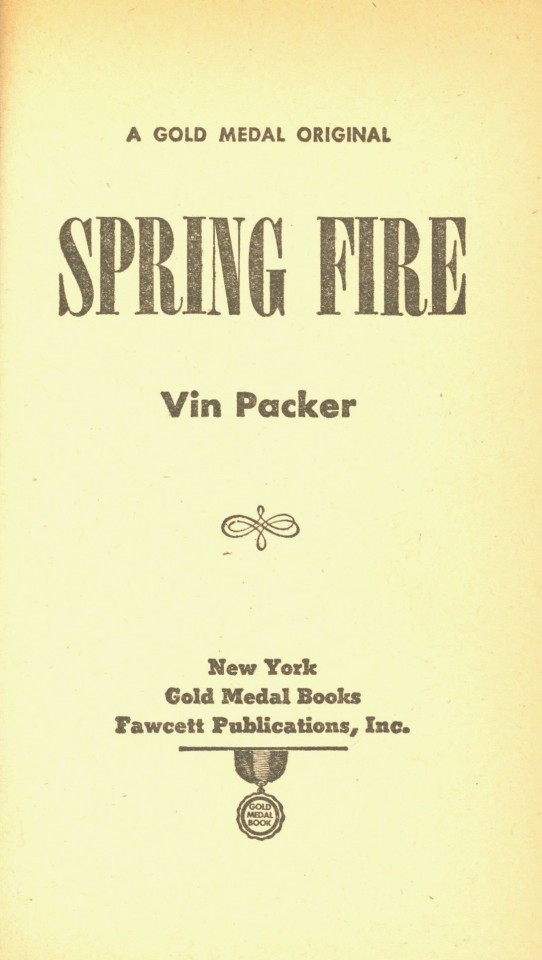

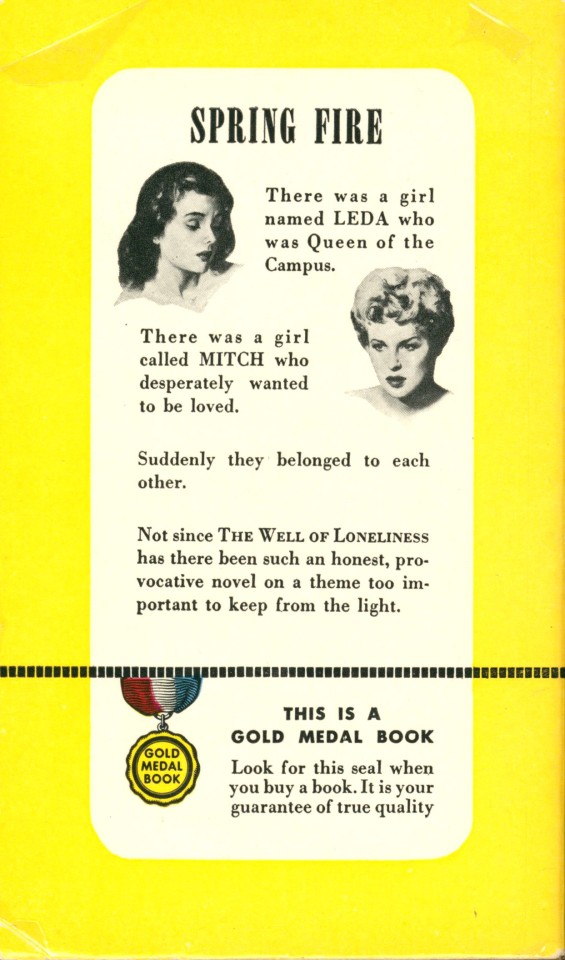
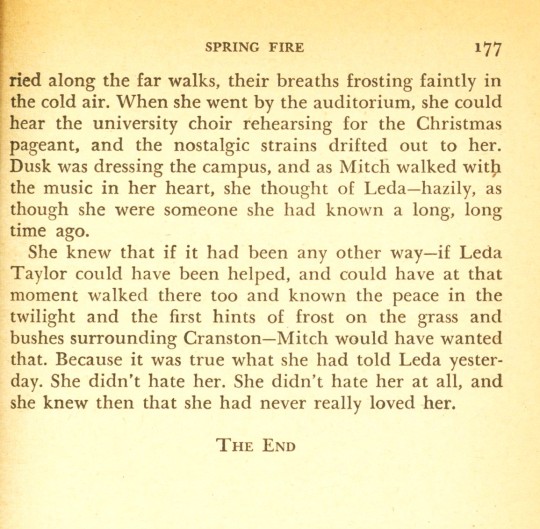
Steamy Saturday
Spring Fire by Vin Packer, the pen name of American writer Marijane Meaker (1927-2022), was the first lesbian paperback novel and was published in New York by Gold Medal Books in 1952. It was an instant bestseller, outselling other popular titles of that year, including James M. Cain's The Postman Always Rings Twice and Daphne du Maurier's My Cousin Rachel, and its publication marks the beginning of the lesbian pulp fiction genre.
The story, based on Meaker's own experience, revolves around the relationship between the shy and awkward, freshman sorority sister Susan ("Mitch") Mitchell and her more experienced roommate Leda Taylor. Both play at heterosexual "normality," while engaging in and at the same time questioning their same-sex attraction. Unfortunately, because it's the early 1950s, the relationship had to end in tragedy, with Leda bound for an insane asylum and Mitch denying to herself that she ever loved Leda.
Meaker was always distressed about having to write that ending. When Cleis Press approached her to republish the novel, she was very reticent. But the project went forward, and according to Wikipedia, Meaker wrote about this in the introduction to that reissue:
"I still cringe when I think about it. I never wanted it republished. It was too embarrassing." Meaker explained in the 2004 foreword that Dick Carroll, her editor at Gold Medal Books, told her that because the book would be sent through the mail, no references to homosexuality as an attractive life could be portrayed or postal inspectors would send it back to the publishing house. He said that one character must acknowledge that she is not a lesbian, and the other she's involved with "must be sick or crazy."
Beside lesbian romances, Marijane Meaker also wrote mystery and crime novels, nonfiction books about lesbians (as Ann Aldrich), children's books (as Mary James), and young adult fiction (as M. E. Kerr), for which she received the 1993 Margaret A. Edwards Award from the American Library Association. The butch/fem cover illustration is by noted American artist and pulp-fiction cover illustrator Barye Phillips.
View more posts on lesbian romance fiction.
View more LGBTQ+ posts.
View other pulp fiction posts.
#Steamy Saturday#pulp fiction#romance fiction#romance novels#lesbians#lesbian romance novels#lesbian pulp fiction#LGBTQ+#Vin Packer#Marijane Meaker#Spring Fire#Gold Medal Books#homosexuality#UWM LGBT Collection
31 notes
·
View notes
Text
Propelled chiefly by last year’s London production, I have written a (rather) long form piece to do with Rebecca the Musical. Though focusing mainly on this eventual and heavily expectant premiere of the English production of the musical, discussion relates also to the original and other iterations of the show, and musicals more generally, too.
The piece is anchored by the central theme of insatiability while looking in turn at:
the process of tracing the evasive histories of character representations and theatrical productions over many decades – including also flickered and largely forgotten records of the play and opera forms of Rebecca, and the “apparitional”, equivocal lens that queer female sexuality is handled with across large spans of time
decoding evidence of sparse, if periodically rather dire, female queerness in theatrical, musical contexts – guided by the disciples of dykeish dissatisfaction in the musical’s character of Mrs Danvers or the story’s primary author of Daphne du Maurier herself
considering what it means to exist as an audience member responding in situ to (principally female) performers with thrilling voices, both in and outside an auditorium, and the delicate but frequently under-discussed predicament of queer female diva devotion.
Take a look if you're interested!
In further expansion of photographic documentation of each of the examined stage-based, theatrical iterations of Rebecca, more images are presented below.
Discussion originates from the existence of the 2023 English premiere production of Rebecca the Musical at the Charing Cross Theatre in London, where cast principals included Kara Lane as Mrs Danvers (alternated by Melanie Bright), Lauren Jones as I (the new Mrs de Winter), and Richard Carson as Maxim. Photos by myself.



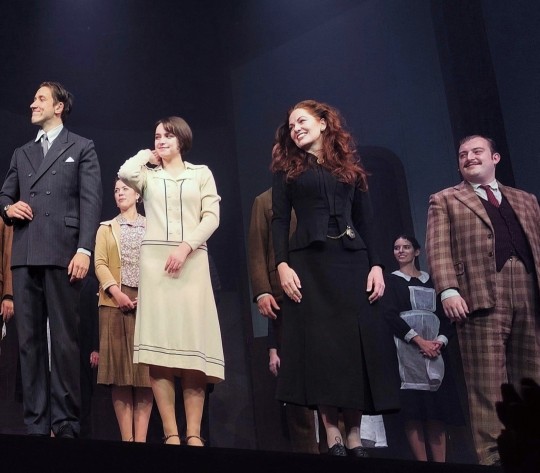
The first stage production of Rebecca arose much earlier, concerning the 1939 play by the same name at the Queen’s Theatre on Shaftesbury Avenue (now The Sondheim Theatre). Daphne du Maurier herself wrote its script. Margaret Rutherford played Mrs Danvers, Celia Johnson was the new Mrs de Winter, Owen Nares appeared as Maxim. The Queen’s Theatre was bombed in 1940 during WWII at the time of Rebecca’s occupancy, becoming the first theatre in London to be hit by a wartime bomb, and bringing to an immediate premature close the show’s successful run - and highlighting earlier associations of this story's connection to tumultuous tales and dramatic events in histories of it's staging, as the attempted primary stagings of the English musical iteration would later return to.
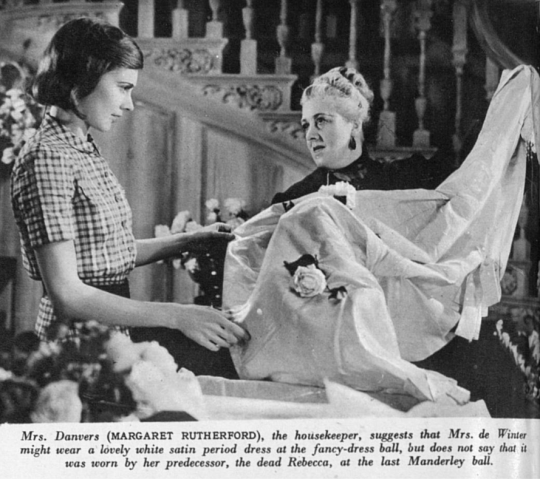



Photos from this first theatrical, London production include those by Angus McBean from a periodical spread entitled ‘Mystery and Murder in Stately Cornish Home - Dramatic Moments of Du Maurier’s “Rebecca.”’, published in The Sketch (vol. 190), May 1940.


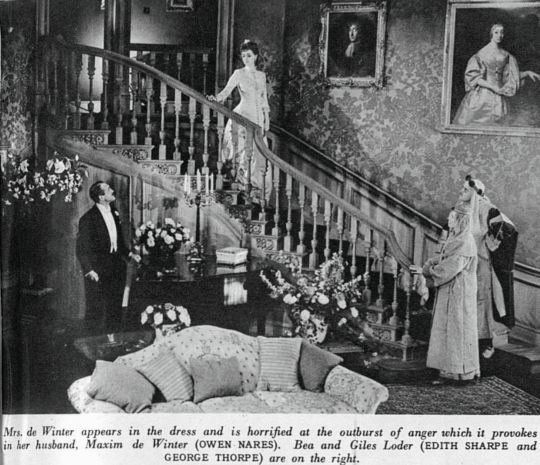

The play also then appeared on the road in America, and subsequently on Broadway in 1945 at the Ethel Barrymore Theatre for a fleeting 20 performances; and of this entity, record remains even more scarce. Cast principals included: Florence Reed (Mrs Danvers), Diana Barrymore (the new Mrs de Winter), Bramwell Fletcher (Maxim).
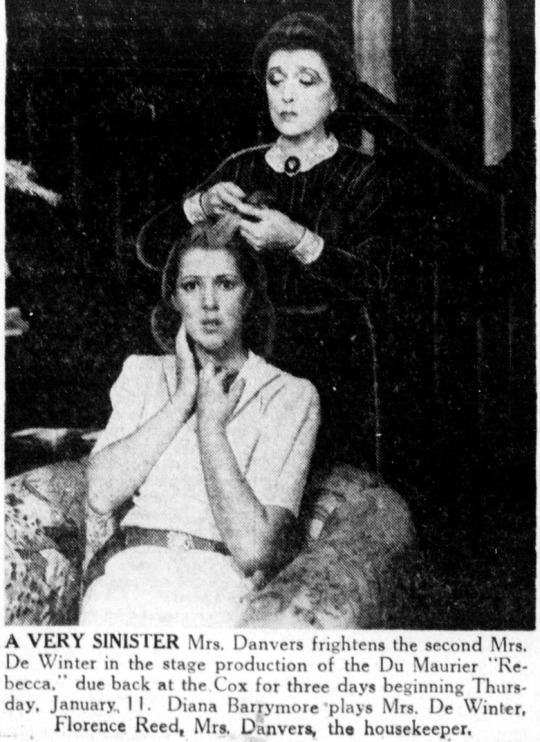
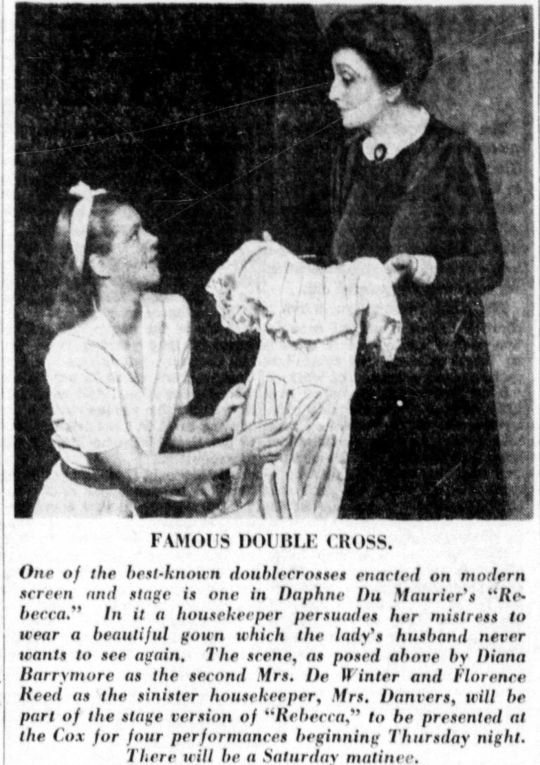


The next and last distinct adaptation of Rebecca to appear on stage before the musical was the 1983 opera production devised for Opera North, with music by Wilfred Josephs and libretto by Edward Marsh. It toured the UK before being revived briefly in 1988 and never seen again. Cast principals included: Ann Howard as Mrs Danvers, with Gillian Sullivan and later Anne Williams-King as the new Mrs de Winter, and Peter Knapp as Maxim.
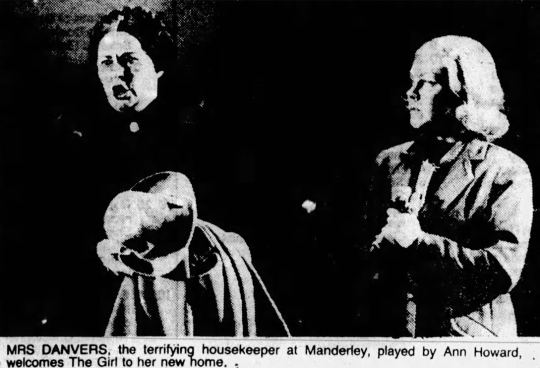
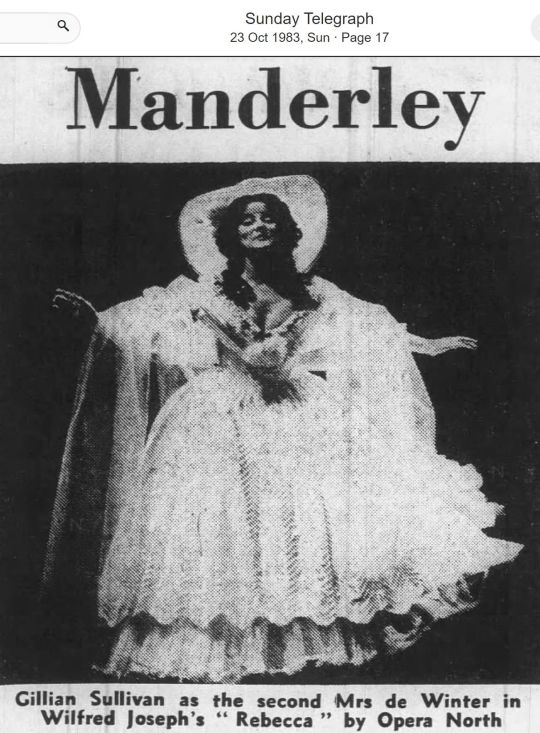
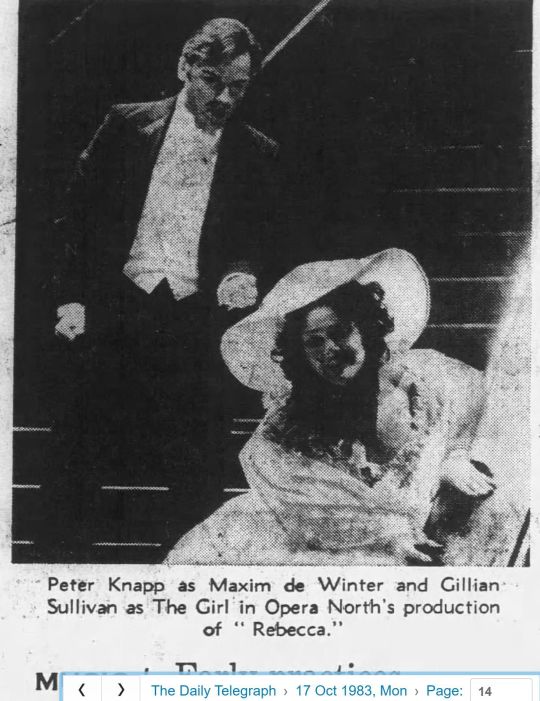
Finding these few, historic photographs in obscure newspapers or consulting original scripts and librettos, for instance, in libraries and archives during this effortful and active treasure-hunting felt special and rewarding. But possible reconstruction of these stage iterations in the present day is only incompletely possible, because of reduced ease of access to or apparent remaining visceral evidence of a visceral art form.
The frustration in trying to seek out these apparitional traces not only foregrounds the importance of maintaining accessible, comprehensive primary records within the theatre, but mirrors also the act of trying to seek out records of queer female sexuality across history in works of literature, cinema or theatre, as a process typified by a similarly effortful navigation of apparitional erasure. This facet connects with the notion that consideration around Rebecca entangles with a web of insatiability or dykeish dissatisfaction, a web that stretches from this erasure and liminality of representation, to character constructions within the work – including of its infamous housekeeper, Mrs Danvers, to contextual backgrounds like those of the story’s primary author itself, Daphne du Maurier.
The entity of Rebecca, then, across its many themes, productions and decades, is uniquely useful in the way it can in turn encompass and facilitate explorations of these many facets – being capable of simultaneously holding consideration of these expansive webs of documentation, erasure or dykeish dissatisfaction that can be found lurking in historical margins, as well as also the contrasting luminous energy that can be produced in the present in association with the musical, as physical audiences interact with and respond to the material of the show and its performers within theatres in real time. These considerations have transferrable applicability beyond this singular context of this particular show to more general notions of theatrical pieces and the practice of theatregoing, too, as they foreground the question of how audience members respond to, process, and interact with shows; and, as a matter of far less common discussion or scholarly writing on the subject of diva devotion, how female fans specifically navigate the complex predicament of queer, female, performance-driven high regard.
#rebecca the musical#rebecca das musical#rebecca#mrs danvers#ich#the new mrs de winter#daphne du maurier#lonbecca#rebecca london#kara lane#willemijn verkaik#musical theatre#musicals#terry castle#wayne koestenbaum#the apparitional lesbian#theatre
18 notes
·
View notes
Text
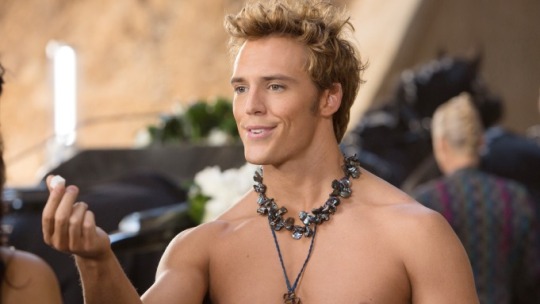
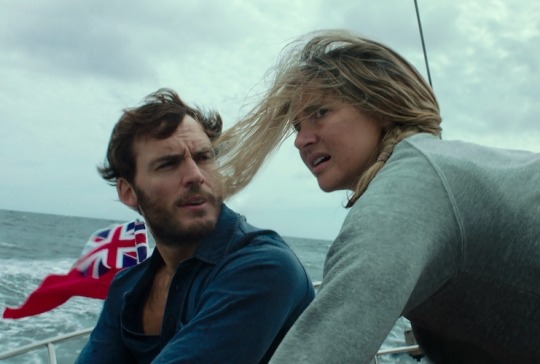
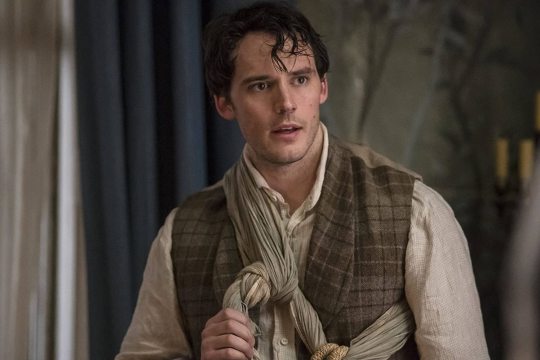
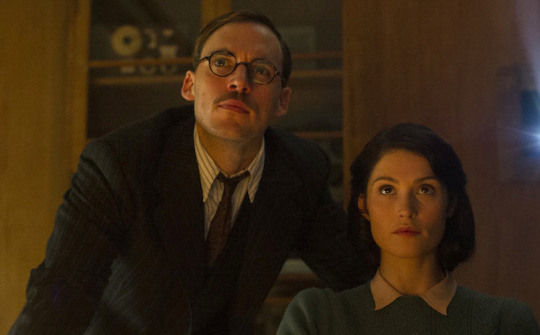
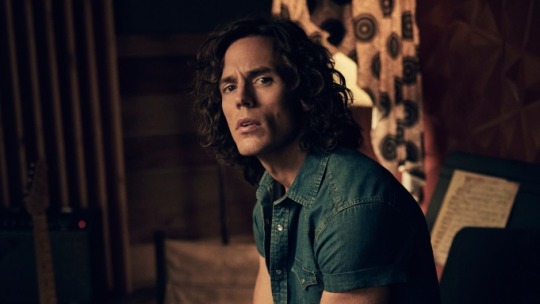
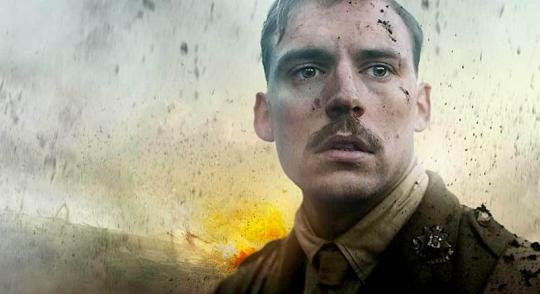
Sam Claflin and Adaptations (there's a lot more than you think!)
Articles and interviews be like: Sam, you have done so many book adaptations and then name at most three titles. Every fucking time. Luckily, I'm here to tell you about them! (Under the cut as it got long.)
Hunger Games Catching Fire and Mockingjay (books written by Suzanne Collins) - YA dystopia. The most obvious, of course. Sam plays Finnick Odair, the coolest character. (He's not dead, Katniss is lying.)
Daisy Jones and the Six (book written by Taylor Jenkins Reid) - story of a rise and fall of fictional band in the 1970s. Sam is Billy Dunne, the main male lead and a real rockstar!
My Cousin Rachel (book written by Daphne du Maurier) - Gothic thriller, 19th century. Sam is the narrator, Philip. This is my personal favourite.
Their Finest - adaptation of Their Finest Hour and a Half (book written by Lissa Evans) - Drama with bits of comedy. Set during WW2 in the film industry. Sam plays screenwriter Buckley, a member of a film crew working on a film about Dunkirk evacuation. Also features a side character who is gay and is alive at the end. More people should watch this film, imo.
Enola Holmes (book written by Nancy Springer) - kiddie Sherlockian pastiche. Sam plays Mycroft Holmes, at least that's his character's name, but it's not the usual Mycroft; his version is dumbed-down and cartoon-villainised so that the eponymous teenage girlboss can have her story.
Adrift - adaptation of Red Sky in the Mourning (book written by Tami Oldham Ashcroft) - survival drama of a seafaring couple lost at sea after a hurricane. Sam is the main character's love interest, Richard.
Two mini series from Sam's early career (that I haven't watched so can't give you any info):
Pillars of the Earth (book written by Ken Follett) - TV mini series set in 12th century about building of a cathedral. This was Sam's very first role.
Any Human Heart (book written by William Boyd) - TV mini series, chronicles a life of a writer in 20th century. Sam plays the youngest version of the main character, Logan.
Adaptations of plays - it counts, okay?
Journey's End (play written by RC Sherriff) - WW1 war film, but not a regular one (there's no battles). Covers a week in the trenches in March 1918. Sam plays Captain Stanhope, an officer at the edge of nervous breakdown. One of his best performances, if not the very best.
Riot Club (play written by Laura Wade) - contemporary film about a posh elite club at Oxford. Sam's character, Alistair, is a spoiled brat, Draco Malfoy-like. (Not the good fanon version, the bad canon version.) Btw, this is no Dead Poet's Society, no dark academia - the titular club is based on Bullingdon Club (of which Boris Johnson was member). They book a table at restaurants, trash them and then hand the owners a cheque to compensate. You see now why we have all these problems...
You can make an argument for:
Snow White and the Huntsman - (folk tale recorded by Brothers Grimm). It's a darker retelling. Sam plays William, the prince charming of the story.
Snow White and the Red Shoes, (as above) an animated film, he voices a character named Merlin. No idea what this is as I haven't seen it.
Okay now I'm stretching it
Pirates of the Caribbean On Stranger Tides - adapted from a Disneyland ride. BUT the ride itself was inspired by legendary tales of pirates, among others the books of Emilio Salgari. So, not that crazy. Might be the weakest of the franchise, but Sam's storyline--he plays the missionary Philip--is what saves it, his romance with the mermaid is just the cutest!
So that's it. Thank you for reading and I hope you check some of these out.
#sam claflin#sam claflin meta#adaptations#samblogging#i KNOW i missed 2 out#i don't talk about them#also everyone knows them anyway#mypost
101 notes
·
View notes
Text
2022 reading list >:)
fiction:
charlotte brontë, jane eyre
n.k. jemisin, the stone sky
victor hugo, les misérables
susanna clarke, piranesi
james baldwin, giovanni's room
tamsyn muir, gideon the ninth
tamsyn muir, harrow the ninth
emily brontë, wuthering heights
ursula k le guin, the left hand of darkness
oscar wilde, the picture of dorian gray
isaac fellman, dead collections
joan lindsay, picnic at hanging rock
shirley jackson, dark tales
gretchen felker-martin, manhunt
herman melville, moby dick
octavia butler, parable of the sower
shola von reinhold, lote
larissa lai, the tiger flu
alison rumfitt, tell me i'm worthless
julia armfield, our wives under the sea
shirley jackson, the haunting of hill house
miguel de cervantes, don quixote
toni morrison, the bluest eye
isaac babel, odessa stories
alexandre dumas, the count of monte cristo
daphne du maurier, rebecca
clark ashton smith, the dark eidolon and other fantasies
rivers solomon, the deep
akwaeke emezi, freshwater
e.m. forster, a room with a view
vladimir nabokov, lolita
ayse papatya bucak, the trojan war museum and other stories
sheridan le fanu, carmilla
e.m. forster, maurice
tamsyn muir, nona the ninth
vladimir nabokov, pale fire
shirley jackson, we have always lived in the castle
jorge luis borges, fictions
henry james, the turn of the screw
tamsyn muir, undercover
ling ma, severance
orhan pamuk, the museum of innocence
shirley jackson, hangsaman
nonfiction:
vijay prashad, no free left: the futures of indian communism
eduardo galeano, open veins of latin america
hakim adi, pan-africanism: a history
paulo freire, pedagogy of the oppressed
a rainbow thread: an anthology of queer jewish texts ed. noam sienna
kwame nkrumah, africa must unite
vijay prashad, red star over the third world
norm finkelstein, the holocaust industry
robin wall kimmerer, braiding sweetgrass
vladimir lenin, the state and revolution
saidiya hartman, wayward lives, beautiful experiments
john aberth, from the brink of the apocalypse
erik butler, metamorphoses of the vampire in literature and film
amin maalouf, the crusades through arab eyes
anandi ramamurthy, black star: britain's asian youth movements
christopher chitty, sexual hegemony
shakespearean gothic, ed. christy desmet and anne williams
cervantes' don quixote: a casebook, ed. roberto gonzález echevarria
edward said, culture and imperialism
emily hobson, lavender and red: liberation and solidarity in the gay and lesbian left
audre lorde, zami: a new spelling of my name
ghassan kanafani, on zionist literature
afsaneh najmabadi, women with moustaches and men without beards: gender and sexual anxieties of iranian modernity
jamie berrout, essays against publishing
beverley bryan, stella dadzie, suzanne scafe, heart of the race: black women's lives in britain
jamaica kincaid, a small place
friedrich engels, socialism: utopian and scientific
poetry:
trish salah, lyric sexology
melissa range, scriptorium
wendy trevino, cruel fiction
june jordan, selected poems
#.txt#i skipped a few that were just like. very famous plays or whatever but!#you see what i mean abt how much i need to Read More Poetry :(#also: posts that make you think about the inadequacy of the fiction/nonfiction distinction
127 notes
·
View notes
Note
do you have any gothic romance book recs? im wanting to write one and have half an idea but i want some inspo
for sure!
the mysteries of udolpho and the italian, ann radcliffe.
the monk, matthew lewis. along the same lines as the italian but several orders of magnitude more deranged. and agnes is one of my personal favorite gothic heroines ever - it’s the religious trauma.
wuthering heights, emily brontë. the one and only.
“ligeia” and “the fall of the house of usher,” edgar allan poe.
a long fatal love chase, louisa may alcott.
thérèse raquin, émile zola. don’t let the “naturalist,” “realist” veneer fool you; the dynamics in this one are pure gothic.
the phantom of the opera, gaston leroux. the novel is a sight less melodramatic than the musical (said affectionately) but everything about the, ah, O.G. christine and erik still makes me want to gnaw off my own leg.
rebecca, daphne du maurier.
interview with the vampire, anne rice. every weepy woman fleeing from a house of horrors and every brooding, byronic master thereof want what louis and lestat have.
flowers in the attic, v.c. andrews. otherwise known as a contributing factor to why my URL is tybaltsjuliet and why “the fall of the house of usher” is on this list of gothic romances.
the little stranger, sarah waters. this one is fun because i enjoy a gothic romance that is narrated by the deeply relatable yet deeply toxic male lead!
honorable mentions:
“christabel,” samuel taylor coleridge. not a book, not a story, even - a poem, unfinished, at that - but good god, whatever’s going on between christabel and the lady geraldine broke my brain when i first read this one.
fingersmith, sarah waters. i hemmed and hawed over this one because i really do not think of it as a gothic, myself, but a lot of people do! who am i to dismiss that when this list can include a really terrific queer neo-victorian novel.
#sorry for the delay in responding by the way! i have been traveling.#this feels eclectic but i hope it provides a varied assembly of inspiration#;ask me your questions and get some answers.
116 notes
·
View notes
Text
In honour of recently completing my 2023 challenge of reading 50+ books this year, here are 10 books that I enjoyed in 2023 in no particular ranked order. (My reading taste leans towards the atmospheric, dark, satirical, suspenseful, strange and horror-tinged, btw):
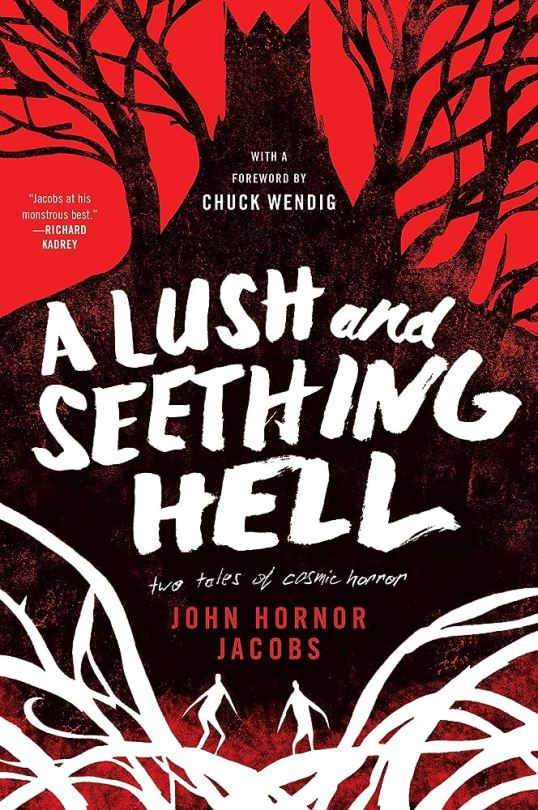
1 A Lush and Seething Hell by John Hornor Jacobs
I'm currently in the process of reading this one (it's two small novels in one book), but I can already recommend it based just on the style and the quality of the first story. Somehow feels similar to me to catching an odd old foreign film on TV late at night when I'm the only person awake and then getting unexpectedly invested in it.
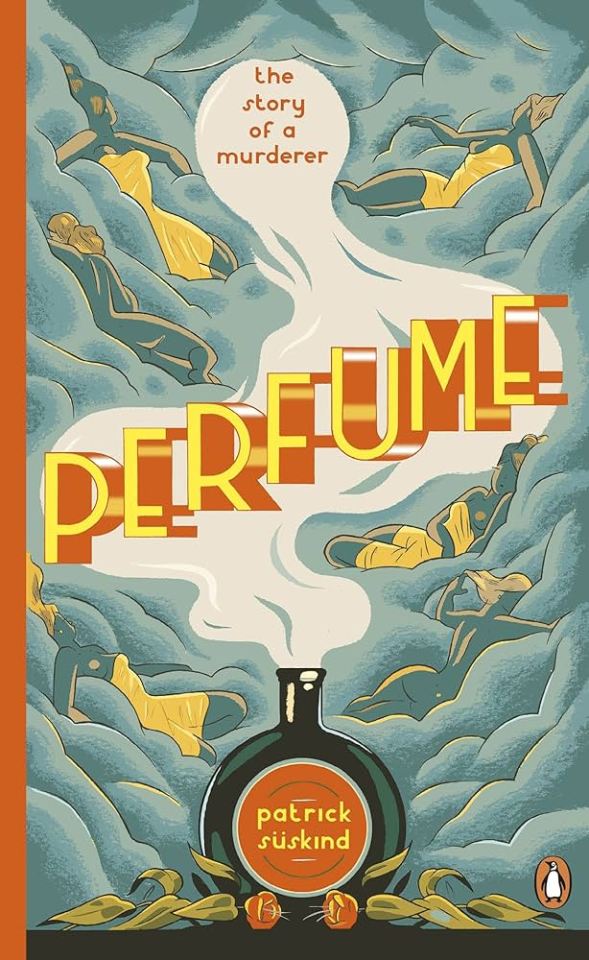
2 Perfume: The Story of a Murderer by Patrick Süskind
I'd read the first few chapters of this over a decade ago and they were so instantly memorable and vividly told that they remained burned into my mind ever since. Love the attention to detail in bringing this grotesque version of 1700s France to life, and how much the story made me think about my sense of smell and other familiar things in new ways
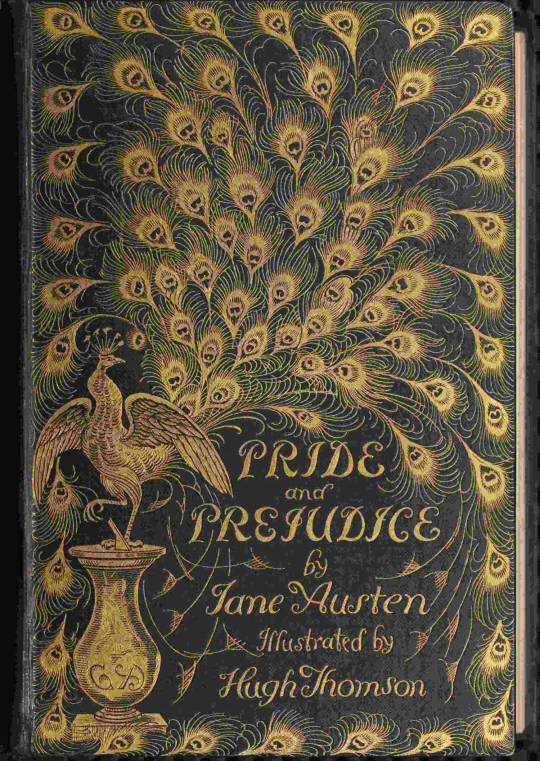
3 Pride and Prejudice by Jane Austen
Funnier than I expected! Almost more a comedy than a romance in my opinion. Just very pleasant to read in general. I laughed out loud several times
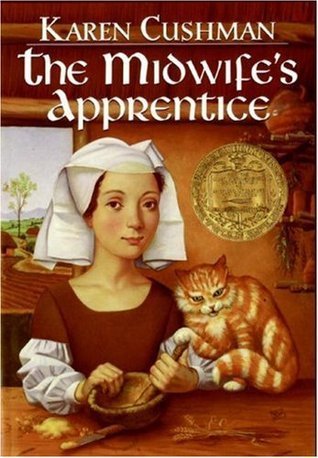
4 The Midwife's Apprentice by Karen Cushman
This was a childhood favourite of mine that I decided to revisit, and it actually held up very well. I found the dark and cruel and gossipy little village that Beetle has to try to survive in fascinating, and same with learning about all the weird (historically accurate!) shit that was involved in medieval midwifery
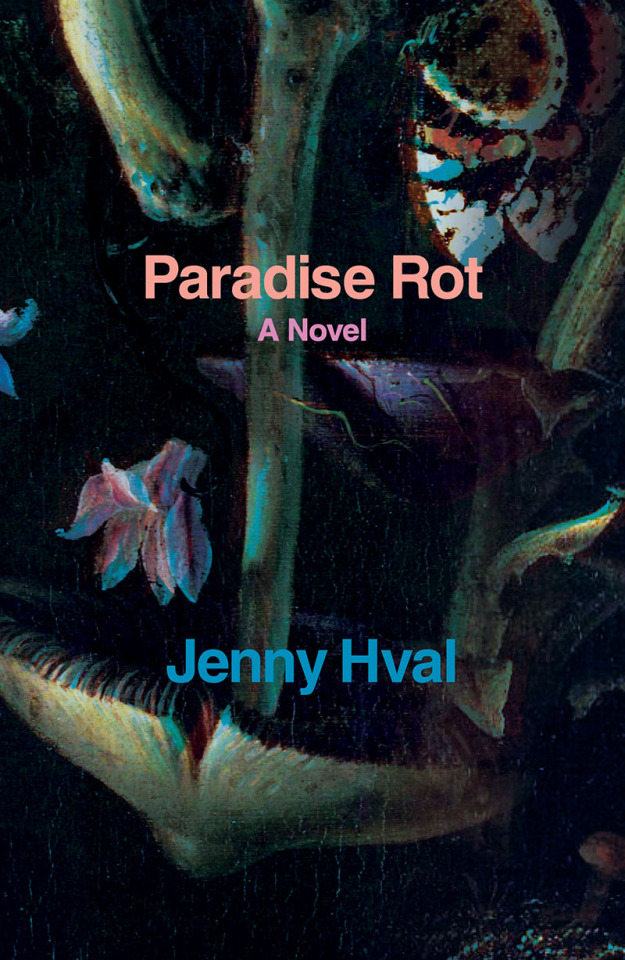
5 Paradise Rot by Jenny Hval
I've mentioned this one on this blog already, but it feels like a surreal and melancholy bad dream in the best kind of way. More going on here to think about than just being the "lesbian piss book" (though you will find a generous helping of both things in the pages haha). Sticky and unsettling to read, like living in a compost pile, and probably not for everyone. But also poetic and lush and tense and and yeah, kinda gay
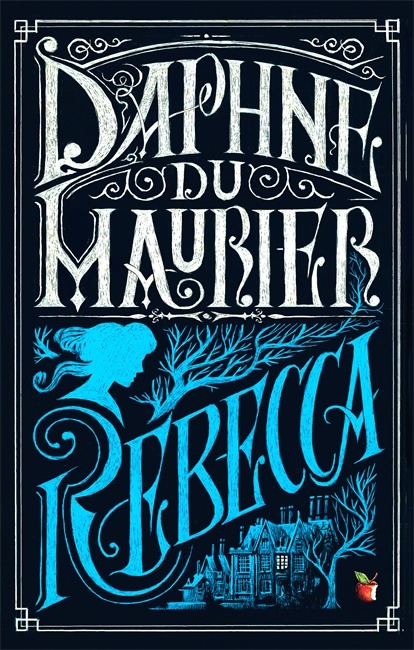
6 Rebecca by Daphne Du Maurier
As fun and compulsively readable as a modern thrillers while also being complex and atmospheric and literary all at once. Somehow I still didn't have all the twists and turns spoiled for me beforehand! A definite 5/5 from me
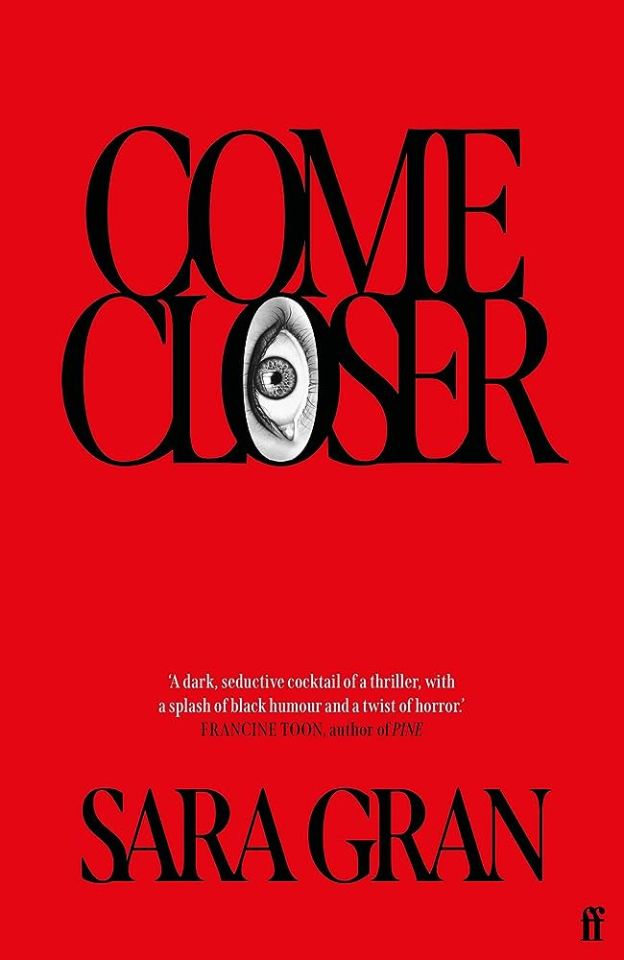
7 Come Closer by Sara Gran
A strange, unsettling and brisk little book about demonic possession that was very easy to fly through in less than a day. Might have benefitted from being left a little more ambiguous overall (imo), but still entertaining to read, and grabs you right from the first page
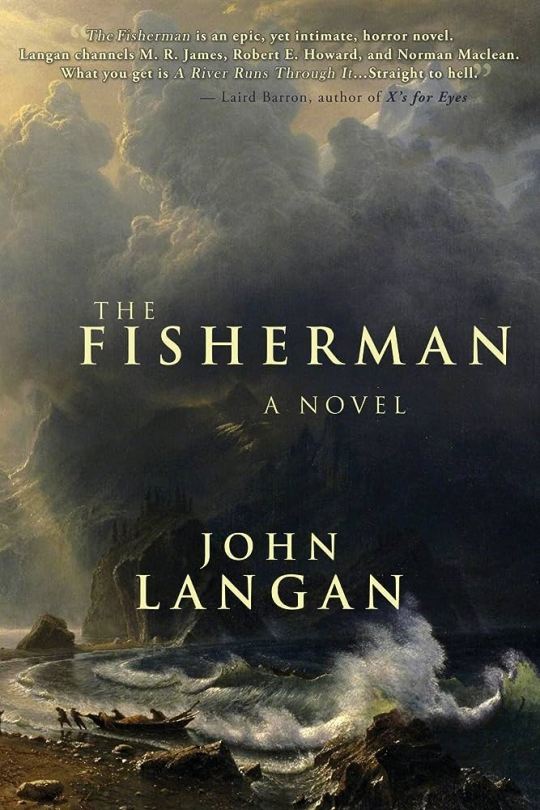
8 The Fisherman by John Langan
An extremely imaginative and detailed little universe is fleshed out here that includes some fascinating true-to-life history (did you know sometimes entire towns were vacated and stripped bare so giant water reservoirs could be built on top of them? And that the buildings are still just sitting down there under all that water sometimes? Well, you'll learn all about it here). Some very haunting imagery and characters and scenes that will easily burn themselves into your brain

9 Annihilation by Jeff VanderMeer
Creepy science fiction that feels a bit like embarking on a D&D campaign with some companions you don't actually trust or know very well. This one grew on me more over time as one that continued to stick with me a while after I had finished it. The mysteriousness and ambiguity of what's actually going on can either spur you to finish the whole series or simply give you a ton of food for thought to mull over and dissect
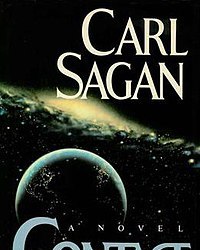
10 Contact by Carl Sagan
ALIENS! A very timely topic considering the types of news stories we've been getting in 2023. I was already familiar with Carl Sagan because of his Cosmos TV series, and only recently found out he wrote some fiction as well. Very pleasantly surprised at how well-written it is and that he put a female protagonist at the helm, and how he can share his expertise and knowledge and theories in the books in an easily accessible and entertaining way
27 notes
·
View notes